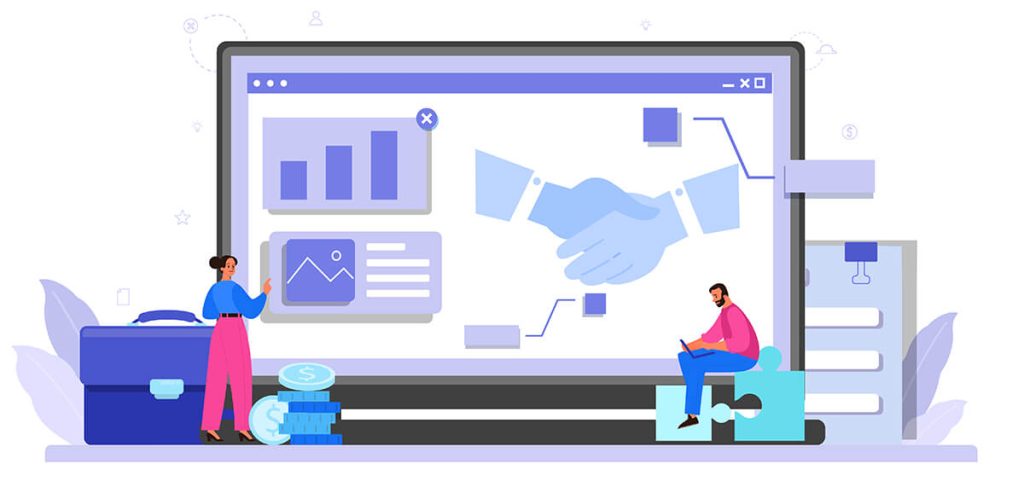
Direct selling is a type of marketing that involves selling a product or service directly to customers in any location aside from the permanent business location. Though direct selling is usually done face-to-face, it can also be done using social media.
Also referred to as networking, direct selling is based on personal contact with the customer. While it works like affiliate marketing, it takes a more door-to-door salesman approach, which was how it was traditionally done.
In today’s post, we’ll discuss what exactly direct selling entails, why it’s making a comeback, and how it can benefit you as a wholesaler. So let’s get right into it!
Direct Selling: Definition And Methods
The Balance provides a simple definition for direct selling:
With direct selling, distributors avoid intermediaries in the supply chain and sell products directly to consumers. In traditional retail settings, products are sold online or at a physical store, but direct selling relies heavily on salespeople getting in front of customers in nontraditional settings.
In other words, direct selling involves getting up close and personal with your client or customer, sometimes demonstrating the uses of your products and even giving them free samples to try out. A good example of a company that uses direct selling is Oriflame.
Businesses use several direct selling methods, including:
- Sales at the manufacturer’s head office
- House-to-house selling. Also known as door-to-door selling, businesses often use this method when introducing a new product on the market.
- Sales by mail order
- Sales by opening retail shops. This is usually done when the products are perishable, like ice cream. For example, the manufacturer could open a retail shop to sell their products to customers.
- Sales through mechanical devices such as vending machines

The Return Of Direct Selling
Direct selling is making a strong comeback, and it’s largely the youth who are involved in this marketing technique. It’s no mystery why.
The entrepreneurial bug has bitten a great number of people. As a result, many business owners have turned to direct selling as a way to make money while staying at home and being their own boss. But what does this mean for your business as a wholesaler?
Manufacturers sell their products to wholesalers, who sell the products to retailers, who finally sell the products to the customers. Direct selling happens when the manufacturer decides to cut out all the middlemen and market straight to the customer.
Does this mean direct selling poses a threat to your wholesale business? Not necessarily! After all, there are products you can’t sell as a direct seller. Not to mention there are products only wholesalers can sell.
Also, take note that direct selling is a very mobile business. Thus, as a wholesaler, you can get a piece of the action by employing salespeople who can deliver your products straight to your customers. In other words, direct selling can benefit wholesalers as well as other types of businesses.

What Are The Reasons Why Manufacturers Would Turn To Direct Selling?
Below, we discuss three scenarios that can encourage manufacturers to use direct selling.
- The manufacturer’s physical location is close to most of its customers. In such a case, why not just sell the products straight from the warehouse? There’s no need to send the products to a retailer when the customers are right outside the manufactuerer’s door.
- The manufacturer isn’t satisfied with its retailers for various reasons. For example, one retailer could have bad customer service, while another could lack the ability to generate a profit for the manufacturer.
- The manufacturer may have perishable products, such as fruits, that need to be sold off immediately before they go bad. Similarly, manufacturers need to sell fashionable items before they go out of style.
Now for the good news: wholesalers can also turn to direct selling for any of the above reasons! Just like getting affiliate marketers to promote and sell your products, you can get salespeople to directly sell your products or services to consumers.

How Direct Selling Can Benefit Manufacturers And Wholesalers
We can think of four major advantages of direct selling:
- For starters, direct selling is cheaper and can boost sales. Remember: this method entails selling directly to customers without going through middlemen. Thus, you don’t need to pay said middlemen, letting you cut down on extra costs, which in turn can boost your revenue. For this reason, direct selling can benefit manufacturers and wholesalers.
- Direct selling lets you get feedback from your clientele. Your salespeople can probe your customers for their opinions about your products. This can help you determine how you can improve your products so that they can attract more customers.
- In addition, direct selling is a great way to test products and services. For example, if your customers return to you without complaints about their purchases, then you’ll know your products serve as solutions to their issues.
- Lastly, direct selling can help you gauge how strong the market is for a particular product. Are people buying your product? Then you’ll know there’s a demand for it. Otherwise, it might be a good idea to improve said product or sell something else altogether.

The Advantages For People Who Decide To Be Direct Sellers
Whether you’re a small business owner or someone who simply wishes to sell some stuff, direct selling may also be the right choice for you.
- First of all, direct selling gives you freedom. After all, you’re your own boss! Thus, you’re free to work where you want, whenever you want, and however you want to. Also, you can market the products that companies give you any way you want to.
- Direct selling lets you enjoy commissions. For example, you can build teams, then have those teams do the selling for you. Then, you receive commissions based on the volume your team members get. Take note, however, that the commission amount depends on the company you’re selling for.
- There’s no need for employees. If you’re up to the task, you don’t need employees to engage in direct selling. This is especially true if you aim to use social media for your marketing and selling needs.
- There’s little to no financial investment. Some companies require you to buy their products before you can sell them. However, some give you their products for a smaller starting fee, while others give you products for free.
- You don’t have to do any inventory or create new content. Do you have only a few items to sell? Then you may not need to maintain a complicated record of the products in your inventory. You may even be able to survive without creating promotional content.
- You don’t need many customers. Though you may need strong business builders on your team, you won’t need a large number of customers to earn you a healthy and steady business income.

The Disadvantages Of Direct Selling
Everything has its downsides, and that includes direct selling. Despite all its good points, direct selling can give rise to the following issues:
- Not every product can be sold via direct selling. Manufacturers and wholesalers should realize that direct selling is limited to certain types of products, such as clothes, shoes, health drinks, supplements, cosmetics, and the like.
- Recruiting and training salespersons may be difficult. The larger your company, the greater your need for personnel who can engage in direct selling. Unfortunately, because not everyone can make a good salesperson, you may have a hard time finding the right people for the job.
The Challenges Direct Sellers Could Face
Are you a small business that’s considering directly selling to your customers? Know that it isn’t without its challenges. Below are the three key problems you could end up facing as a direct seller:
- Direct selling is still sales. Not everyone can do a good job of directly selling to customers.
- You have to make your sales pitch to people you already know, like family, friends, neighbors, and colleagues. For some, this could cause discomfort.
- It could be difficult keeping customers, business partners, or team members. Some could start collaborating with you, then decide direct selling isn’t meant for them, and back out.

Conclusion
Direct selling involves selling a product or service directly to customers in a non-retail setting. Today, it’s making a comeback, which can benefit everyone from small businesses to manufacturers and even wholesalers.
To recap, anyone considering directly selling to their customers should familiarize themselves with the following information:
- Direct selling definition and methods
- Why direct selling is making a comeback
- The reasons manufacturers turn to direct selling
- How direct selling benefits manufacturers and wholesalers
- How direct selling benefits small companies
- The disadvantages of direct selling
- The challenges direct sellers could face
Do you have any questions about direct selling? How about the tools you can use to enhance your wholesale store? Let us know in the comments section below!



